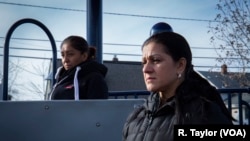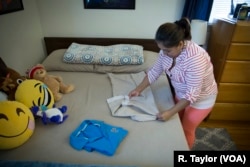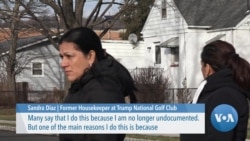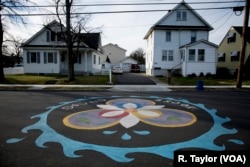A Guatemalan woman is coming clean about a secret she says kept her in a void for five years.
Victorina Morales said in a recent interview with The New York Times that she was employed by the Trump National Golf Club in New Jersey as a housekeeper. Morales says she did so as an undocumented worker and gained employment using false documents.
Morales, 45, says she wasn’t the only person working there illegally and that a manager was aware of their status.
Her revelation, published Dec. 6, comes amid a debate over immigration and border security.
President Donald Trump has said he wants $5 billion to build a wall along the southern U.S. border and that a partial government shutdown will continue until he gets the money from Congress.
WATCH: Guatemalan Woman Discusses Working at Trump Property as Undocumented Worker
Tending to the Trump family
Amid the manicured green hills and the opulent Georgian manor of the New Jersey golf club, Morales tended to the housekeeping needs of members of the first family, including President Trump, his daughter Ivanka and first lady Melania Trump.
Her first day on the job was April 15, 2013, the day after her interview. From fellow housekeeper and confidante Sandra Diaz, a Costa Rican who at the time of her employment was undocumented, Morales picked up the ground rules: no perfume or makeup, special shoes to enter. Among the president’s pet peeves: dust and flies.
“I’ll come back when they’re gone,” Diaz recalled Trump saying once, disgusted by the flies in his clubhouse patio. Flies are common during New Jersey’s humid summer months.
“He gets red hot, angry,” Diaz added.
On the property grounds, Melania was strict, but courteous. Ivanka rarely said hello. But Donald Trump was, for the most part, thoughtful toward workers who met his expectations, the two women attest. He kept $100, $50 and $20 bills in his nightstand, according to Diaz, lining his pockets daily to tip those worthy of his praise, which included Morales and Diaz.
The problem was not the president, Morales thought, at least not initially.
“I just met a good blond man,” she told Diaz. “I would tell people, this man is so good. He gives us tips. He never looks down upon us.”
Abuse allegations
In 1999, Morales endured dehydration and hunger in the Texas desert, at one point covered in ants while lying flat to hide from “la migra,” U.S. Border Patrol officers. Fourteen years later, on Trump’s property for the first time, Morales looked to heaven.
“Beautiful God,” she said, “You have opened these doors for me.”
What Morales didn’t realize at the time was the length one supervisor would go to make her and other undocumented workers feel inferior.
The supervisor initially reassured her, “We take good papers and bad papers,” a contradiction of Trump’s insistence, three years later on the campaign trail, that his company “didn’t have one illegal immigrant on the job.”
The then-presidential candidate’s on-air comments baffled his employees. As foreign-born workers, they took offense to Trump’s 2015 attack on undocumented Mexican immigrants: “They’re bringing drugs. They’re bringing crime. They’re rapists. And some, I assume, are good people.”
“Is it that he’s crazy? Why this attitude toward us?” Morales said she wondered privately at her home in nearby Bound Brook, New Jersey.
“We began to speak amongst ourselves,” said Diaz, who had left the Trump property for another job. “But everyone stayed quiet, because everyone had their own interests.”
WATCH: Guatemalan Woman Talks About Her Treatment at Trump Property
According to Morales, it was then that her supervisor, emboldened by the president, became more aggressive. It was those actions that have led Morales and Diaz to consider a civil lawsuit against the Trump Organization, alleging workplace abuse and discrimination.
“She told us we were donkeys … that her dog understood more English than us,” Morales told VOA.
On multiple occasions, Morales alleges the supervisor shoved her while inside the laundry room, once nearly causing Morales to hit her forehead on the corner of a washing machine.
“Vicky called me, crying,” said Diaz, after one such incident. “[Her supervisor] told her that if she tried to leave the institution or complained about it … migration [immigration authorities] could show up at her door.”
VOA reached out to both the Trump Organization and the White House for comment, but multiple requests went unanswered.
“Supervisors felt that they had the protection of the commander-in-chief,” said attorney Anibal Romero, who is representing both Morales and Diaz. “This is something we see a lot today, where employers are using immigration as an excuse [to justify their actions].”
Morales decided she had had enough. Introduced through Diaz, Romero studied Morales’ case and asked if she was willing to go on record.
“Yes,” she told him. “I’m not afraid. I’ve lost my fear since I was little.”
Life of resilience
When she was 7 years old, Morales says she begged her father’s killer to stop, as the assailant kicked and stabbed him outside their home. She jumped on the man. The man slapped her and forced her head against the ground.
“Do what you want with me, but do not touch my daughter, please!” a tearful Morales recalled her father pleading with his killer.
Decades later, long after reuniting with her husband in the United States, Morales learned that her father-in-law had been hacked to death with a machete by killers who knew that family in the U.S. had sent him money, which he’d spent to buy a tractor.
When her eldest son and brother-in-law were threatened, Morales and her husband scrambled to bring them to the United States.
Looking ahead
Through her lawyer, Morales recently applied for asylum for her and her family, an option she says she didn’t know existed before. The process is ongoing, but Morales has faith everything will work out.
She has not returned to the golf course and recently lost an off-the-books night job cleaning offices after The New York Times story revealed her undocumented status. Supported by her husband, who mows lawns during the day and holds a second job at night to afford their $1,800 monthly rent and living expenses, Morales said she has no regrets.
Morales removed her Facebook account before their story went public, as she and Diaz expected a swarm of disparaging comments from anonymous anti-immigrant readers. And they got them.
“She certainly knows how to milk the system,” said one Times reader from Fairfax, Virginia.
“They are here due to failed policies, poor border enforcement, and Democratic opposition to any action against illegal immigrants,” wrote another reader from Texas.
In the initial New York Times report by Miriam Jordan, Diaz and Morales claimed they were not the only undocumented workers on Trump’s property, and several more women have since come forward, according to attorney Romero. Although it’s hardly the strength in numbers Diaz and Morales hoped for, the two said they have no regrets.
“I cannot turn around, like many people do, and not give a hand to someone like Vicky, who needs to have her story heard,” Diaz said, defending her decision to come forward.
“This role we have taken on is to show that there are brave women,” Morales added.
Willing to listen
There is a saying in Guatemala that Morales adopted when she was young: La sonrisa en la cara y el luto en el corazón. “A smile on the face and mourning in the heart.”
Morales is one of roughly 7.8 million undocumented immigrants ages 18 and older who work in the U.S., in many cases holding jobs that “people who have papers don’t want,” Diaz said.
“Not just anyone can handle the pressure, the speed, and the treatment,” she added.
“[Trump] has always used us,” she added, acknowledging there is no way of knowing whether the president or first lady ever knew of their undocumented status. Still, she maintains, “He used us to get to power.”
Morales said her faith in God has given her strength.
“I don’t speak for just myself, I speak for all my fellow immigrants,” Morales said. “Let’s stop hiding. There are people willing to listen.”












